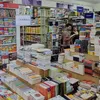Curiosity, consistency, commitment – tips on artistic success from exhibitors at the Karnataka Chitrakala exhibition
Practice, originality, and appreciation of business realties are key elements of creative success, as explained by artists at this exhibition in Bengaluru.
Launched in 2014, PhotoSparks is a weekly feature from YourStory, with photographs that celebrate the spirit of creativity and innovation. In the earlier 775 posts, we featured an art festival, cartoon gallery. world music festival, telecom expo, millets fair, climate change expo, wildlife conference, startup festival, Diwali rangoli, and jazz festival.
Karnataka Chitrakala Paristhath in Bengaluru is a popular hub for showcasing the artworks of emerging as well as established artists. The works of 14 artists were displayed at a recent exhibition, some of whose creations are featured in this photo essay.
Three artists also share their insights on what art means to them, how they prepared their featured artworks, what needs to be done to improve art appreciation in society, how exhibitions benefit artists, and how aspiring artists can prepare themselves for the long creative journey.

Art and meaning
“Art is a pathway to discovering my authentic self. It enables me to concentrate on what truly matters to me,” portrait artist Lavanya S tells YourStory.
She finds self-expression through art to be deeply fulfilling. “Such self-exploration can only occur through inner reflection and intensive meditation practices,” she adds.
For the exhibition, she crafted a special Adiyogi painting and a Buddha pencil drawing. “Adiyogi and Buddha serve as guiding lights in this journey of self-discovery and introspection,” she describes. Her artworks are priced from Rs 5,000 to Rs 50,000.

“Art is part of my journey which adds happiness to my life,” artist and interior designer Swathi R describes. Her artworks feature modern interiors, water colour portraits, and miniature art. They are priced from Rs 6,000 to Rs 25,000.
For artist Rosalin Kurella, art is an exploration of the soul. She presented a series on Indian culture and temples, priced from Rs 10,000 to Rs 20,000.
“I am passionate to work in ancient art and sculpture,” she says, reminiscing about her childhood visits to the Jagannath temple.

Artistic resilience
The artistic journey is full of twists and turns, and artists need to learn from mistakes and failures to move ahead with their experiments.
“Mistakes and failures are the best part of art. They lead us to ways which we would have never thought of or imagined. Mistakes are always a plus point for an artist to learn more,” Swathi explains.
“Due to our curiosity, artists may attempt multiple mediums or art forms simultaneously, leading to struggles in achieving excellence in any one style or form of art,” Lavanya cautions.

Innate curiosity is needed to learn and experiment, but maintaining consistency is also key. “I believe it's more effective to focus on one style or form of art at a time,” she suggests.
Artists should not worry about failure, according to Kurella.
“Artists have to practice their work and create new things. Success will come to them through daily practice,” she affirms.

Art appreciation
All the exhibitors call for greater art appreciation in society. Festivals and exhibitions on cultural subjects help here. Educational campaigns are essential to grasp the integral nature and importance of art, Lavanya says.
“India has always been culturally rich across generations, but due to the modern educational system and corporate job environment, many traditional art forms and crafts are being lost,” she laments.
Governments should take the initiative to integrate local art forms into the mainstream educational system. “We can then witness a significant difference in how people appreciate art,” she suggests.
“Government schemes of financial assistance to professional groups and individuals are important. “They help in execution of specific art projects,” Kurella advises.

Next steps
Lavanya was pleased with the appreciation she got at the exhibition, particularly for her realistic pencil drawings, and artworks on Buddha and Gangadhara Shiva.
“Among my pieces, Nurturence has resonated deeply with viewers, portraying the tender care a newborn receives from their great-grandmother during a gentle bath,” she recalls.
“However, I've yet to encounter genuine art buyers. Instead, many seemed to expect exceptional pieces at lower prices,” she says.

The exhibition experience helped Swathi gain more confidence as well. “Most of the people liked my mini sketches, clay art, and interior-related paintings,” she enthuses.
“It was a wonderful experience to interact with art lovers and get their feedback. It encourages me to proceed with my art work,” Kurella says.
As for next projects, Swathi is working on two portraits and interior-related texture art, while Kurella is preparing a new series on Indian culture for an art festival in Hyderabad.
Lavanya is currently immersed in creating a painting of Goddess Saraswati. “She is regarded as the divine embodiment of all art forms and knowledge. As an artist, I deeply recognise the profound significance of the presence of the Goddess in everyone's life,” she says.

Tips and advice
Lavanya advises aspiring artists to prioritise the development of their skills and creativity over time. It is equally important to understanding the business aspects of art.
“It is crucial for artists to recognise the value of their creations. They shouldn't give them away for free or at very low prices,” she suggests.
Instead of solely relying on art festivals and galleries, artists should diversify their income streams. “This could involve teaching art online or offline, providing a reliable source of income alongside their artistic pursuits,” she adds.

“Work in silence. Your success will speak to world. Art is my life, peace and world to me,” Kurella says.
“Never let the art go from you. Art is meant to set you free,” Swathi signs off.
Now what have you done today to pause in your busy schedule and harness your creative side for a better world?









Lavanya S

Swathi R

Rosalin Kurella
(All photographs were taken by Madanmohan Rao on location at the exhibition.)











